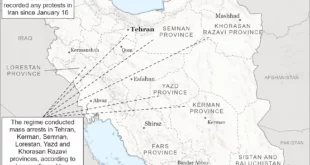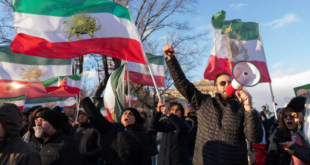The discontent in the kingdom has reached the royals, and this is where changes can happen.
April seems to be a month of ill-fortune in the annals of the Hashemite Kingdom of Jordan. In the beginning of April 2021, Jordanian authorities reported foiling a plot against the regime of King Abdullah II, led by no other than the former Crown Prince, his half-brother Prince Hamzah – a plot described by many as an attempted coup. A few days later, the same authorities called their own reports a storm in a teacup.
“Nothing can come close to the shock and the pain and anger I felt, as a brother, and head of the Hashemite family,” Abdullah said in a statement. He later said that Hamzah had signed a pledge of support and the crisis was over. Hamzah, who like Abdullah is a son of the late King Hussein, served as the country’s crown prince since the death of his father in 1999 until he was stripped of his position by the king in 2004.
In April of 1957, however, there was a real coup attempt; in fact, one of the most dangerous challenges to the authority of the Hashemite dynasty and the new young King Hussein, father of the current monarch.
Within a span of few days, the king had to deal with insurrection led by two chiefs of staff, first Ali Abu Nuwar, a personal friend, whom he nominated to the job at the expense of Glubb Pasha, the loyal Briton who established the Jordanian Army – the Arab Legion – considered to this very day as one of the finest Arab armies.
Abu Nuwar was a Nasserite and plotted to remove Hussein his benefactor, and failed, but his successor, Ali Al Hayari, within three days of his appointment tried to repeat the same plot, only to be dismissed himself as well. Here is the lesson: Jordan under the Hashemite dynasty has never been a really stable political entity in the sense that we understand it in the Western world. Yet, Jordan has been considered more stable than most Arab states. A paradox? Not really, but to understand the turbulent history of the kingdom we need a dose of history, something which gives us a better perspective.
It was in 1921, when then-British colonial secretary Winston Churchill tried to shape the new Middle East post-WW1. At the Cairo Conference which he presided over, states were created as if by moving pawns on a chess board.
One such state was created by betraying the Jews and violating the terms of the Balfour Declaration. It was the Emirate of Transjordan given to the Emir Abdullah the Hashemite, the second son of Sharif Hussein, the head of the Hashemite family who crossed the lines of history and religion, and in June 1916 declared the Arab Rebellion against the Ottoman Empire.
At the time, Amman – which would become the capital of the new Emirate and later state – had a population of a few thousand; today it is more than four million. By 1921, most of its residents were Circassians brought there in the 1880s by the Ottomans after the Russian occupation of the Circassian country.
The entire territory was a land hardly populated, with some small settled villages and nomadic Bedouin tribes, lacking anything which could be a basis for a new state. Put in sum, an artificial entity created in order to satisfy the unfulfilled ambitions of the Hashemites and the immediate imperial interests of Britain.
This artificial entity today, a century later, is still ruled by the same dynasty, and it has had only three kings. First, the founder, King Abdullah I, who was murdered in July 1951 in the Old City of Jerusalem. Then his son, King Hussein, who died in 1999, and since then his son, King Abdullah, has reigned.
Compare it to the Hashemites of Iraq, who also got their state from Churchill and who were all murdered in the 1958 revolution led by General Qassim, and compare to Syria, Lebanon, Libya and others. Viewed against this background, one can safely say, that the Jordanian Hashemites have managed to create almost an heaven of stability, all is relative of course. So, what is the secret here?.
The Jordanian regime has created a state based on support of some population groups, mostly Bedouin tribes, the Circassian and Christian minorities (each of these two groups number about 5% of the population]) and even some of the Palestinians who constitute the majority of the population (about 65 %).
These groups can be defined as the Jordanian element in the kingdom. The overall demographic basis of support forms a minority of the population, but it shows total loyalty because it has a vested interest in the preservation of the regime as they share its spoils to a much larger extent than their numerical weight, particularly by their over representation in the army and in the very effective intelligence and internal security apparatus. Here is an interesting phenomenon about Arab politics; Basis of loyalty can be small, but if rooted in tribal/sectarian loyalty, is and usually continues to be very strong , in fact the key to longevity. Look at the royal, tribal regimes of the Arab peninsula, all the way down from the Saudi state, and look at the on- going survivability of the Alawi regime in Syria.
The Hashemites of Jordan have developed this system to the point of an art. But then, there is another factor which has played a major role in their survivability. They have enjoyed external support, which proved to be crucial.
The US, Britain and Israel, each for its reasons, have all come to the rescue of the Hashemite regime in its most dire crises. The crisis of September 1970, Black September as the Palestinians call it, is the most dramatic example, but not the only one.
There were others before and after. Why has it been like this is the question, and the answer is something that needs to be part of every political science curriculum. The strength of the Hashemite regime lies in its weakness. Yes, as ironic as it is, the Hashemites have no alternative inside their kingdom, one which can ensure the same level of stability, as problematic as it is, which they have created.
They are the devil we know, and the devil we do not is always a big and potentially very scary alternative. The problem is , that in the last two decades things have gone wrong in the kingdom, and some of the traditional features and pillars of the regime which was so diligently created by the first two kings have become trouble spots.
First was the dismissal of Prince Hamzah from his position as the Crown Prince to be replaced by Prince Hussein, King Abdullah’s son. It was, of course, within the power of the monarch to do this, but the fact is, that the new Crown Prince is half Palestinian, and the Jordanian element of the population has traditionally harbored suspicions towards the possibility of a Palestinian on the throne.
In 1972, a helicopter carrying then Queen Alia, King Hussein’s third wife who was a Palestinian, crashed and the rumors then were that it was not an accident, but rather a deliberate effort by Jordanian officers to prevent a Palestinian from being the throne.
There have been persistent reports of cracks in the loyalty of some of the Bedouin tribes, particularly in the southern regions of the kingdom bordering Saudi Arabia. Beyond that, there have been reports circulating about the alleged corruption engulfing the king and his immediate family. One example is an apparent joke that the 40th birthday party of the current Queen Rania, a Palestinian, cost a whopping 40 million dollars – a million for each year.
Corruption coupled with deteriorating economic crisis and the effects of COVID-19 led to a wave of criticism of the king in social media. Part of the criticism about the economy was objectively unfair, because the desert country really lacks the basis for a viable economy with the absence of natural resources, tourism due to COVID and the swelling numbers of refugees from neighboring countries, especially Syrians and Iraqis.
Be it as it may, the fact is that in recent months, displays of opposition to the regime, from Bedouins as well as Islamists [mostly Palestinians] have increased, though in most cases did not get the attention they deserve in the Western press.
This is the background to the current crisis. The opposition reached the very close circle of the royals, with Prince Hamzah finally considering it the proper time to start settling scores after his dismissal by King Abdullah from his prior status in 2004.
Let us be clear: Both Abdullah and Hamzah got the best education that England can give, but both still operate within a political environment that is structurally different in light years from what exists in the West. They operate within a society which is still tribalistic and the struggle between them will not be decided by a democratic vote, but rather by a decision within a family and a tribe.
So, when we look at what has happened, and is still happening behind close doors, we can see a typical tribal solution – Uncle (and former Crown Prince) Hassan is mobilized to mediate, a letter of loyalty is sent from Hamzah to Abdullah and the blood connection seems to override any other consideration. Or does it? This is really the question. The discontent in the kingdom has reached the royals, and this is where changes can happen. While for a century the family knew how to resolve its internal conflicts, this may not be the case now.
What has transpired in Jordan is a red light – only a yellow card to the king – but the light should also shine in neighboring countries. A lot is at stake here, and Jerusalem is the place with the highest stakes!
 Eurasia Press & News
Eurasia Press & News




